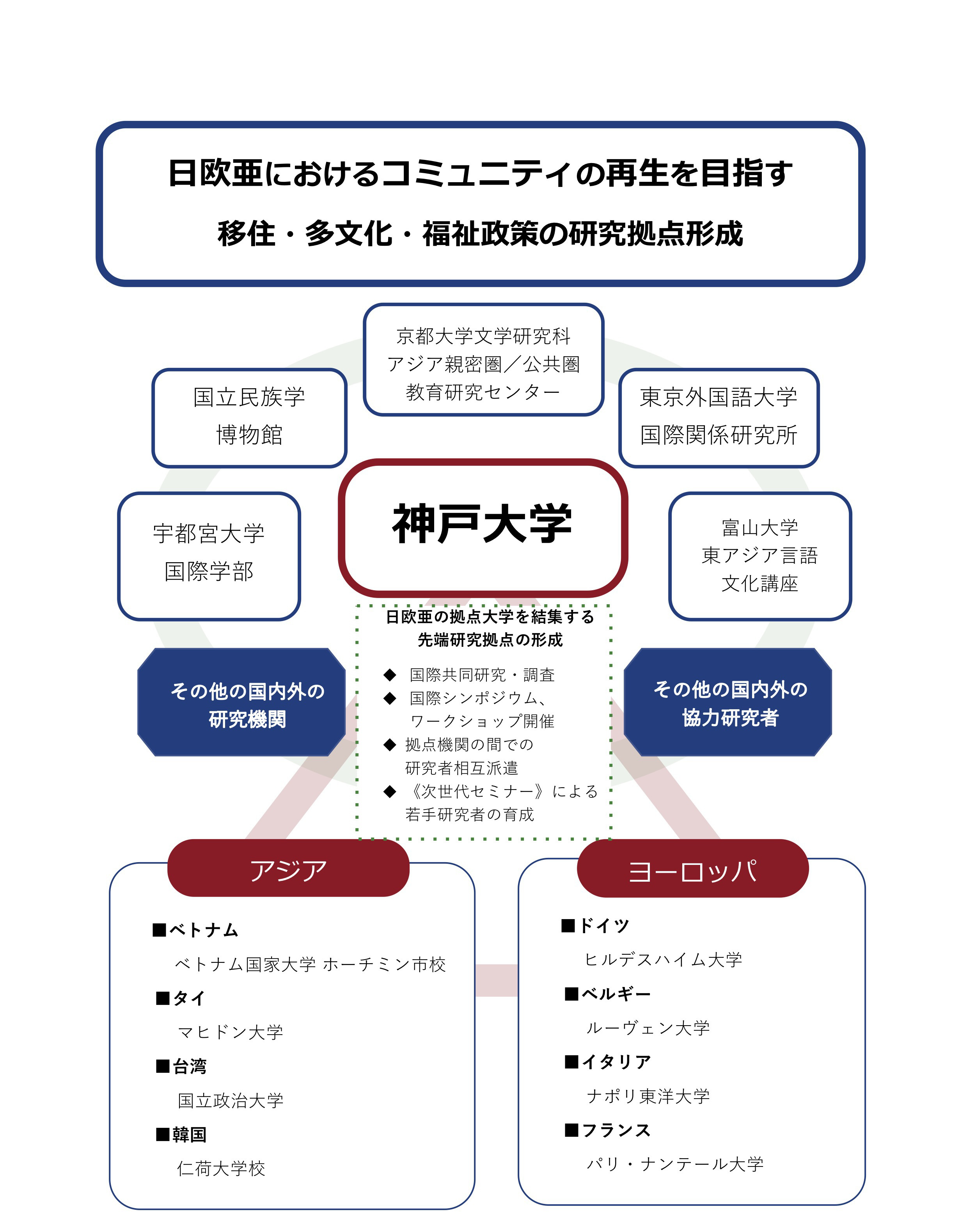研究交流目標 Purpose of Reserch Exchange
現代社会は、日本やEU(欧州連合)に典型的に見られるように、互いに密接に連動する3つの急速な変動に直面している。すなわち、《移住の活発化》によって受入社会の社会的・政治的・経済的不安定が惹起され、《多文化化》の進行によって地域コミュニティが分断される一方、多文化化が福祉的再分配に必要な国民の連帯感を浸食し《福祉国家の揺らぎ》を招きつつある、という危惧である。これら3つの社会的変動は、少子高齢化という長期的な人口動態と相まって、先進社会の安定性と維持をおびやかしつつあるだけでなく、移住者やその家族の人権と福祉に関する深刻な懸念をも日本やEUに突きつけている。
As typically seen in Japan and the European Union (EU), modern society is currently facing three rapid changes that are closely connected with one another. These fears concern the rise of social, political, and economic instability within the receiving society due to intensified migration, divisions in the local community due to the advancement of multiculturalization, and an erosion of citizens’ sense of solidarity with one another, which is critical for welfare redistribution and which is leading to fluctuations in the welfare state. Coupled with the long-term population dynamics of an aging society and a declining birth rate, these three societal changes not only threaten the stability and maintenance of a developed society but also confront Japan and the EU with serious concerns about the human rights and welfare of migrants and their families.
日本は、先進社会特有のこれらの課題をEUと共有するとともに、アジア・太平洋圏とは移住労働の受入れを含む密接な政治的・経済的関係を結んでいる。他方、アジア諸国それ自体も、大規模な移住労働によって社会的変容を遂げつつある。今や、日本、EU、アジアの研究者は、進行するグローバル化のもと、伝統的コミュニティを超えて、安定した新たな生活圏を構築するのに必要な政策を発信するため、多彩な切り口から、斬新かつ建設的な知見を討究かつ共有する責務がある。
Japan shares these specific problems, which are related to developed countries, with the EU; further, it has also committed to close political and economic relationships with countries in the Asian and Pacific Ocean region, which includes agreements to accept migrant workers. Other Asian countries, meanwhile, are undergoing social transformations due to large-scale migrant worker movement. Under an ever-changing globalized environment, therefore, scholars in Japan, EU, and Asia now have the responsibility to investigate and share innovative and constructive knowledge from a variety of perspectives, so as to create the policies necessary for building stable, new living areas that extend beyond traditional communities.
本プロジェクトは、人文科学と社会科学の交錯領域に位置するこの未開拓の課題に、理論と実証の両面から取り組む国際的研究体制を構築するため、明治以来まさに多文化が交差してきた神戸の地に、EUとアジアをつなぐ研究拠点を形成するものである。平成28年度から平成32年度までの5年間、神戸大学国際文化学研究推進センターを中核とし、海外8大学、国内4大学1研究所、および神戸大学内の他の研究科と連携しながら本事業を遂行し、移住・多文化・福祉政策に関する世界水準の研究拠点を構築する。
This project aims to establish a research center that is connected to EU and Asia in Kobe, which has been a multicultural area since the Meiji era, in an effort to construct an international research system that addresses this unexplored problem. This is an issue that lies at the intersection of the humanities and social sciences, from both an empirical and a theoretical standpoint. For five years, from 2016 to 2020, the Kobe University’s Research Center for Promoting Intercultural Studies, in collaboration with eight overseas universities, four Japanese universities, and one research institution along with other research departments at Kobe University will conduct this project and construct a world-class research center for the study of migration, multiculturalization, and welfare policies.
背景と重要性 Background and Significance
本事業の先端性・学術的重要性
The Groundbreaking Project and Its Academic Significance
ヨーロッパへの周辺地域からの移民・難民の最近の急激な増加を見るまでもなく、《移住の活発化》、《多文化化》、《福祉国家の揺らぎ》という先進諸国が直面する3 つの社会的変動は、少子高齢化という人口動態と相まって、日本やEU に社会の持続可能性に関わる深刻な懸念を引き起こしている。国境を越える大規模な〈人間の移動〉は、受入国において国境監視の問題のみならず、政治的・社会的・経済的不安定の問題を惹起しているだけではない。多文化化は、特に地方都市において、産業構造の変化、若年世代の流出、中心市街地の衰退と重なり合い、受入社会と移住者との間の摩擦を生み出し、地域共同体を分断しつつあると警戒されている。他方で、多文化化は、受入社会の不安定化と保守化を招くにとどまらず、福祉国家の基盤たる市民の連帯感を揺るがしかねないと危惧されている。他方、人間の安全保障という観点からは、移住者とその家族の基本的人権と福祉に関しても、早急な制度的手当てが求められている。
Without even considering the recent rapid increase in the number of migrants and refugees in Europe from its surrounding regions, we can say that developing countries face the following three social changes: migration, multiculturalization, and fluctuations in the welfare state, coupled with the demographic trend of a declining birthrate and aging population, that are causing serious concerns about societal sustainability in Japan and the EU. Cross-border, large-scale human movement is not only problematic for border patrols in the receiving countries but also raises problems related to political, social, and financial instability. Particularly in provincial cities, multiculturalization overlaps with changes in industry structure, the outflow of the younger generation, and the decline of central cities; creates friction between the receiving society and migrants; and is assumed to divide local communities. There has also been cautious voices that multiculturalization not only leads to instability and stronger conservatism of the receiving society but also threatens citizens’ sense of solidarity, which is the foundation of a welfare state. From the perspective of human security, however, there is a need for an urgent, systematic treatment of migrants and their families to ensure their basic human rights.
このような最新のグローバルな諸課題に対して、日本、アジア、ヨーロッパの研究者が結集して、共同の調査と討議を行い、観点と背景の相違を越えて、新たな安定的なコミュニティ・生活圏を構築するための知見や提言を発信することは、わが国の学界と行政のみならず、多様な発展段階にある世界各国の研究者や政策策定者にも裨益するところが大である。神戸は1868 年の開港以来、わが国における近代化と多文化化の先駆けの役割を果たしてきた。神戸大学国際文化学研究科が、EU 圏とアジア・太平洋圏の研究者を架橋する研究拠点として機能することは、世界的な「多文化化」研究の進展への重要な寄与になろう。
In response to these recent global challenges, not only academia and the political sphere in Japan but also scholars worldwide at various stages of their professional development and policy-makers will obtain great benefits through the process of bringing together scholars from Japan, Asia, and Europe, conducting joint investigations and discussions, resolving differences in opinion and background, and providing knowledge and proposals related to the building of new, stable communities and living areas. Since the 1868 opening of Japan’s borders, the city of Kobe has been a pioneer in catalyzing the process of multiculturalization and modernization in Japan. By serving as a research center that links researchers from the EU, Asia and Pacific region, the Kobe University Graduate School of Intercultural Studies is making an important contribution to the development of research on global multiculturalization.
本事業を実施する意義
The Significance of This Project
EU の場合、EU 周辺での政治的・経済的破綻と、それに伴う移民・難民の流入とによって、国内の治安問題と国際的安全保障問題の境界線が消失し、言わば「不安定のボーダレス化」という状況が生じている。こうした状況の中で、EU では、移住者に対する受入社会の市民の不安を緩和し、マイノリティを包 摂する地域コミュニティを構築するために、多文化化と福祉国家の両立をめざす社会統合政策が提言されてきている。他方、アジアでは、経済連携協定によってフィリピン、インドネシア、ベトナムが日本に看 護師・介護福祉士候補を送り出しているほか、タイが介護福祉士候補の受入れを要請している。国境を越えて行われるケア労働の外部化は、わが国における再生産労働の変容を象徴するものである。さらに、わが国では、南米系移住労働者の定住増加のため、その子弟たる外国人生徒の数が急増しているが、彼らの高校・大学への進学率が顕著に低い地域が存在するという新しい深刻な教育格差の問題が発生している。
For the EU, the political and economic collapse in nations around the EU and the influx of migrants and refugees that followed gave rise to the loss of borderlines, which is both a domestic and international security issue, and which can be termed “borderless instability.” To alleviate anxiety about migrants among their citizens and to build local communities that include minorities, EU’s receiving countries have proposed social integration policies that aim at achieving both multiculturalization and a welfare state. In Asia, through the Economic Partnership Agreement, the Philippines, Indonesia, and Vietnam are sending nurses and care worker candidates to Japan, and Thailand is also requesting that Japan accept care worker candidates. The externalization of care work that can be performed across borders symbolizes the change in reproductive labor in Japan. In Japan, due to the increase in the number of South American migrant workers settling there, the number of foreign students (migrants’ children) is rapidly growing; however, this phenomenon is giving rise to new problems related to serious inequality in education as there are regions in which the percentage of foreign students who go on to high school and university is extremely low.
このような社会的背景・現状に鑑みれば、移住労働者の受入社会としてEU 社会と諸課題を共有するわが国が、送出し社会たるアジア諸国の研究者と研究交流を推進しつつ、EU の社会統合政策の現状にも詳しいヨーロッパ各地の研究者と連携を深めることは、わが国の社会的課題の解決にも極めて重要である。
Given this social background and the current situation, it is extremely important for us in Japan, which faces similar social issues as the EU, particularly with regard to receiving migrant workers, to resolve our social issues; therefore, we promote research exchange and host scholars from Asian countries, while also deepening our collaboration with European scholars who have a deep understanding of the EU’s social integration policies.
本事業に期待される学術的成果
Academic Results Anticipated from This Project
本課題の経費支給期間である5 年間に、本プロジェクトは共同研究・調査と研究者の相互派遣を恒常的に実施するだけでなく、毎年、平均2 回の国際シンポジウム又はワークショップを世界各地で開催し、相 互の研究発表と共同討議を通じて、「日本、EU 、アジアの社会が、進行するグローバル化と移住の活発化 のもとで、伝統的なコミュニティを超えて、新たな持続的な生活圏(コミュニティ)を構築するには、いかなる知見と政策が必要か」という問題を追究していく。移住労働者の受入社会であるEU と日本とは、ともに先進国であるがゆえに共有する社会的課題も多いが、地政学的影響及び歴史の異同に基づく認識や政 治状況の相違も大きい。したがって、共同研究と意見交換のさらなる促進によって、相互の学術的知見や 政策的提言のレベルがいっそう向上することが期待できる。
Within the next five years, this project will constantly implement joint research and studies and engage in scholar exchanges as well as host international symposia and workshops about twice a year at locations around the world. Through research presentations and joint discussions, this project will continue to address the question “What policies and knowledge do the societies in Japan, EU, and Asia require to build new, sustainable living areas (communities) that transcend traditional communities through an understanding of the advancement of globalization and migration?” Japan and the EU nations, which are currently receiving societies for migrant workers and are also developed countries, certainly share many societal problems; however, they also have great differences in their political situations and understanding based on differences in their geopolitical influence and history. Therefore, through the greater promotion of joint research and opinion exchanges, we can expect that the level of mutual academic understanding, knowledge and policy recommendations will deepen.
例えばEU では、EU 周辺の著しい政治的不安定化が移民問題の発生を引き起こしている一方、先進諸国の少子高齢化や地方都市の空洞化・人口流出等が危惧されているという現状に鑑み、福祉・社会政策についても国民国家を超えたEU レベルでの対応が必要だという主張も唱えられている。移民及び異文化と の共生を促進し、福祉国家体制を維持して、「不安定」要素を軽減するため、様々な政策面での「欧州化」 (Europeanization)、すなわち欧州地域内での国際的標準化も図られつつある。「このような国境を越えた 規範形成がそのままアジアに応用できるのか、できないとすればその要因は何か、応用しうるとすればどのような修正が必要か」というような問題設定自体が、重要な論争点になりうる。このような規範形成モデルがアジアの研究者に何らかの直接の示唆を与えるのか、またEUとアジアとの比較を通じ日本がアジ アの中でいかなる役割を果たすべきかを、この国際的研究ネットワークの中で討究することは、日本、アジア、EU の三極間における新たな認識と合意の地平を切り拓くことへとつながるであろう。
For example, in EU, although considerable political destabilization in regions surrounding the EU has given rise to the development of problems that are mainly related to immigration, the current situation of fear concerning declining birth rates and aging populations and the emptying of regional cities and population outflow require a response at the EU level, one that goes beyond individual nations, regarding welfare and social policies. To promote the harmonious coexistence of immigrants and different cultures, maintain the welfare state system, and reduce the “anxiety” factor, “Europeanization” is being promoted; this means that there is a requirement to create international standards within Europe for various policies. Determining the problems themselves, through answering questions such as “Can norms created transnationally be applied to Asia without any changes? If not, what are the factors related to this? If so, what modifications are necessary?” raise serious matters for debate. Through the efforts of an international network of scholars charged with investigating questions, such as “Can a created-norms model offer any direct suggestions for Asian researchers?” and “Based on a comparison of the EU and Asia, should Japan play any role within Asia?”, perhaps there will be an opening on the horizon in terms of new understanding and agreement between Japan, Asia, and EU.
研究交流計画の概要 Reserch Exchange Plan
急増する移住や多文化化などが惹起している社会的・政治的・経済的な大変動は、もはや国内レベルの調査・研究の範疇には十分に収まらず、送出し社会と受入社会の双方を包摂する国際的な研究ネットワークによる真摯かつ迅速な共同調査・共同討議を必要としている。本プロジェクトでは、主に移住労働者を供給する側のアジアの研究者と受入社会の側にいる日欧の研究者とが、共同研究によって現代的な問題状況を共有したうえで、次の3つの研究交流を遂行する。
The social, political, and economic upheaval that has been produced by rapidly increasing migration and multiculturalization does not adequately fit into surveys and studies on a national level, and we need earnest and prompt joint research and discussions based on an international research network that includes both the “sending society” and the “receiving society”. For this project, Asian scholars, who can primarily represent the position of migrant workers, and Japanese/European scholars, who are part of the receiving society, will conduct the following three research exchanges after sharing the state of contemporary problems through joint research.
① 共同研究
毎年、いずれかの拠点機関に研究者が集結するたびに、それぞれの社会で移住者、その家族、支援者、政策策定者、公的・私的事業体、住民など様々なアクターを対象に、実証的調査を質的・量的両面 において共同で実施する。日本国内では、例えば神戸市や富山県や栃木県など外国人労働者の定住・定着化に際して様々な課題が生まれている地域において、国内の協力機関の助力を得ながら共同で現地調査を遂行し、日本国内の視点と移住労働の送出し社会の視点とを照らし合わせることによって、より安定的かつ持続的な多文化的コミュニティの構築を模索する。
① Joint Research
Every year, when scholars gather at one of the Core Institutes, they collaborate to conduct both qualitative and quantitative empirical research targeting various actors from their respective societies, including migrants and their families and supporters, policy makers, public and private businesses, and citizens. In Japan, for example, when foreign workers settle and become established in Kobe, Toyama, and Tochigi Prefectures, a variety of issues emerge in these areas, and researchers work together to conduct field surveys with the assistance of domestic cooperative agencies. By mutually sharing the domestic perspective in Japan and the viewpoint of societies sending the migrant workers, the study can explore the construction of a more stable and sustainable multicultural community.
② セミナー
拠点機関で毎年定期的に開催されるシンポジウムやワークショップで、社会学、政治学、人類 学、ジェンダー論、国際関係論、文化政策学等の知見を動員しつつ、「移住・福祉国家・人権」、「多文化化状況における地方都市の再興」などの共通テーマをめぐる研究発表と共同討論を重ねることを通じて、再生産労働の変容や新たな都市文化政策の構想などに関する認識の齟齬を埋め、より発展的な多文化的コミュニ ティを構築するための政策研究を行う。また、毎年の国際シンポジウムに併せて、ポスドクや博士後期課程学生の切磋琢磨の場としての《次世代セミナー》を若手研究者自身のイニシアティヴにより開催する。
② Seminar
At the symposia and workshops held regularly each year at the Core Institute, scholars mainly compile research announcements and joint discussions on common themes such as “migration, welfare nation states, and human rights” and the “revival of regional cities facing situations of multiculturalization”; further, they also gather knowledge on sociology, politics, anthropology, gender studies, international relations, and cultural policy studies. Scholars address any differences in understanding concepts, such as the transformation of reproductive labor and new urban cultural policies and perform policy research to build a more constructive multicultural community. Additionally, in conjunction with the annual International Symposium, we hold the Next Generation Seminar based on the initiative of young researchers as a friendly competition site for postdoctoral and doctoral students.
③ 研究者交流
従来は特に予算の問題により研究者の相互交流は制約されていたが、特に神戸大学とアジ ア・EU の諸研究機関との間の研究者相互派遣をいっそう拡大することによって、研究者がお互いに派遣先での共同研究・調査に参加し意見交換を行うだけでなく、研究者養成に教員又は助言者として貢献すること を通して、研究・教育両面における連携を強め、大学機能のいっそうの充実と向上をめざす。
③ Researchers’ Exchange
Traditionally, research exchanges have been constrained, particularly by budget issues. However, due to increased efforts toward scholar exchanges, particularly between Kobe University and various institutions in Asia and Europe, scholars are able to participate not only in joint research and studies at their respective home institutions but also by contributing as a teacher or mentor to the training of other researchers; moreover, they strengthen collaboration in the areas of both research and education and aim to further enhance and improve the functioning of their universities.





